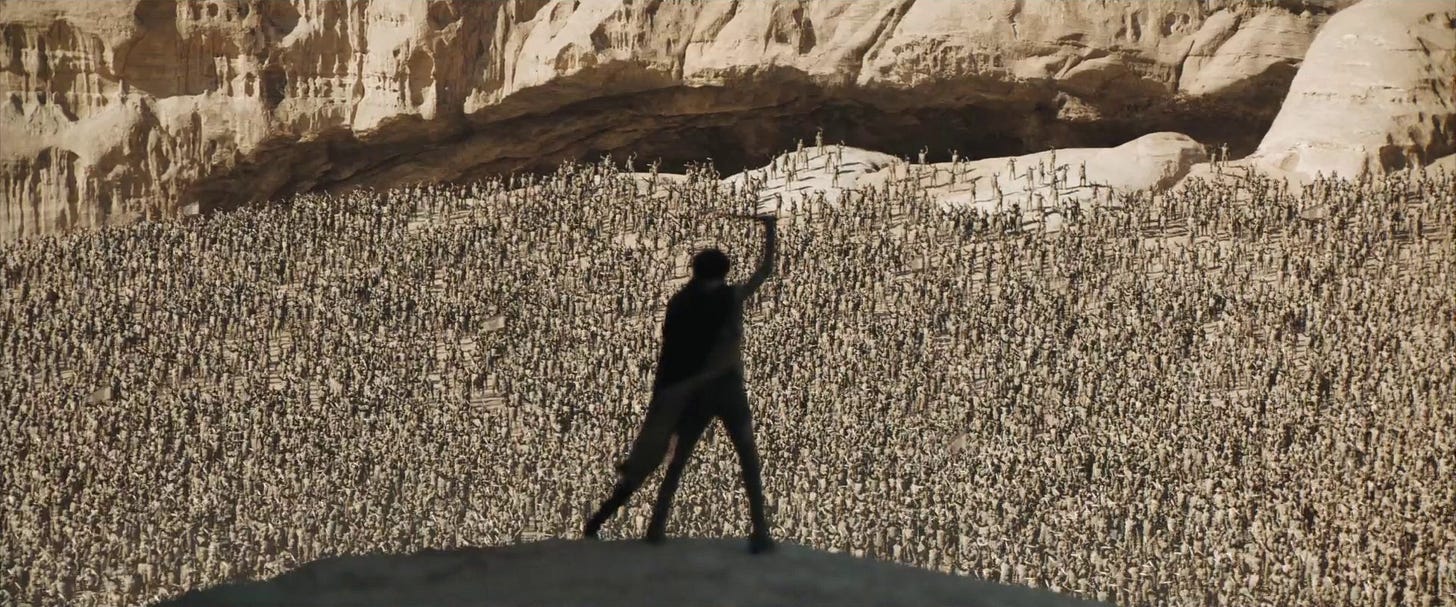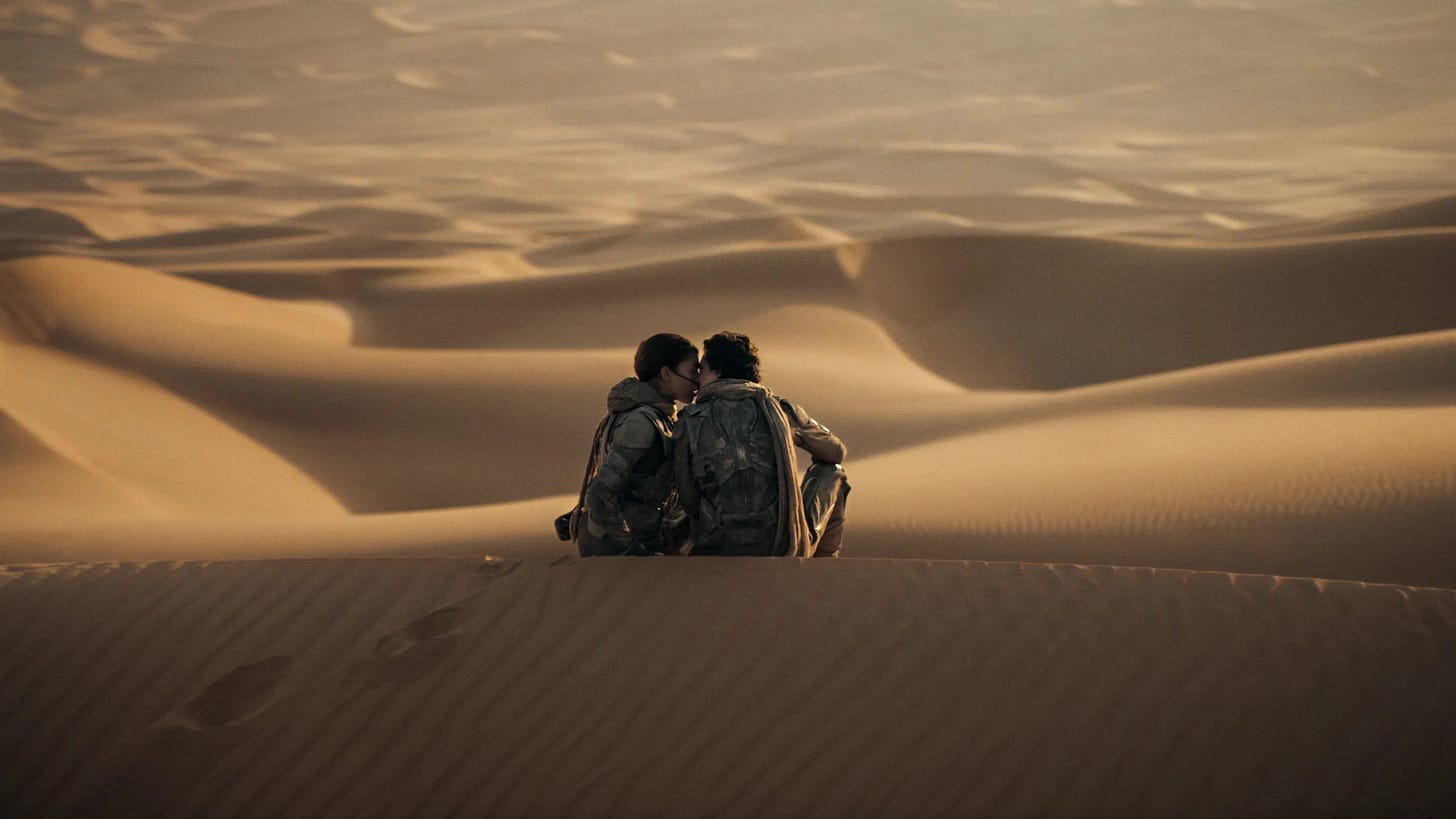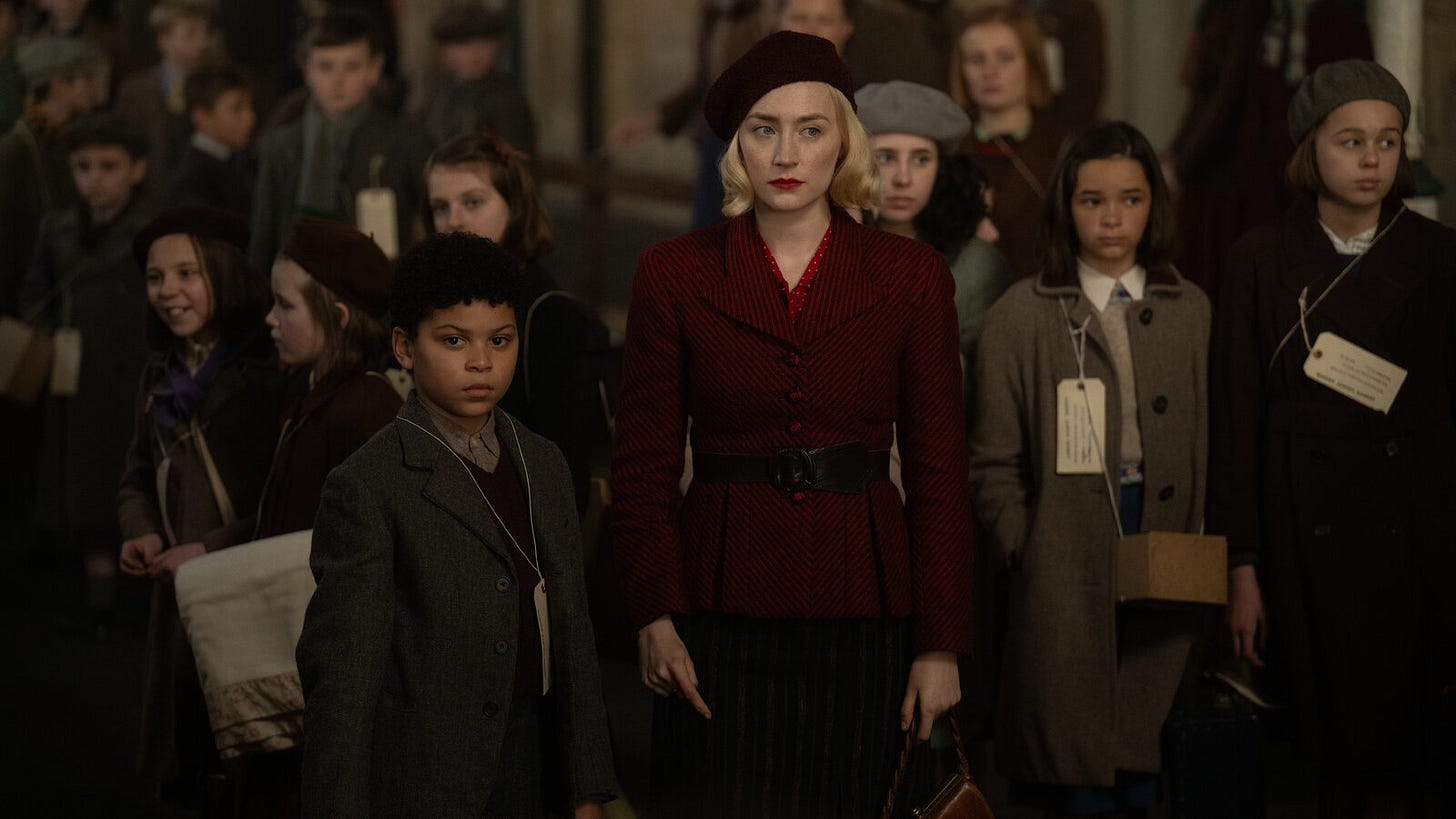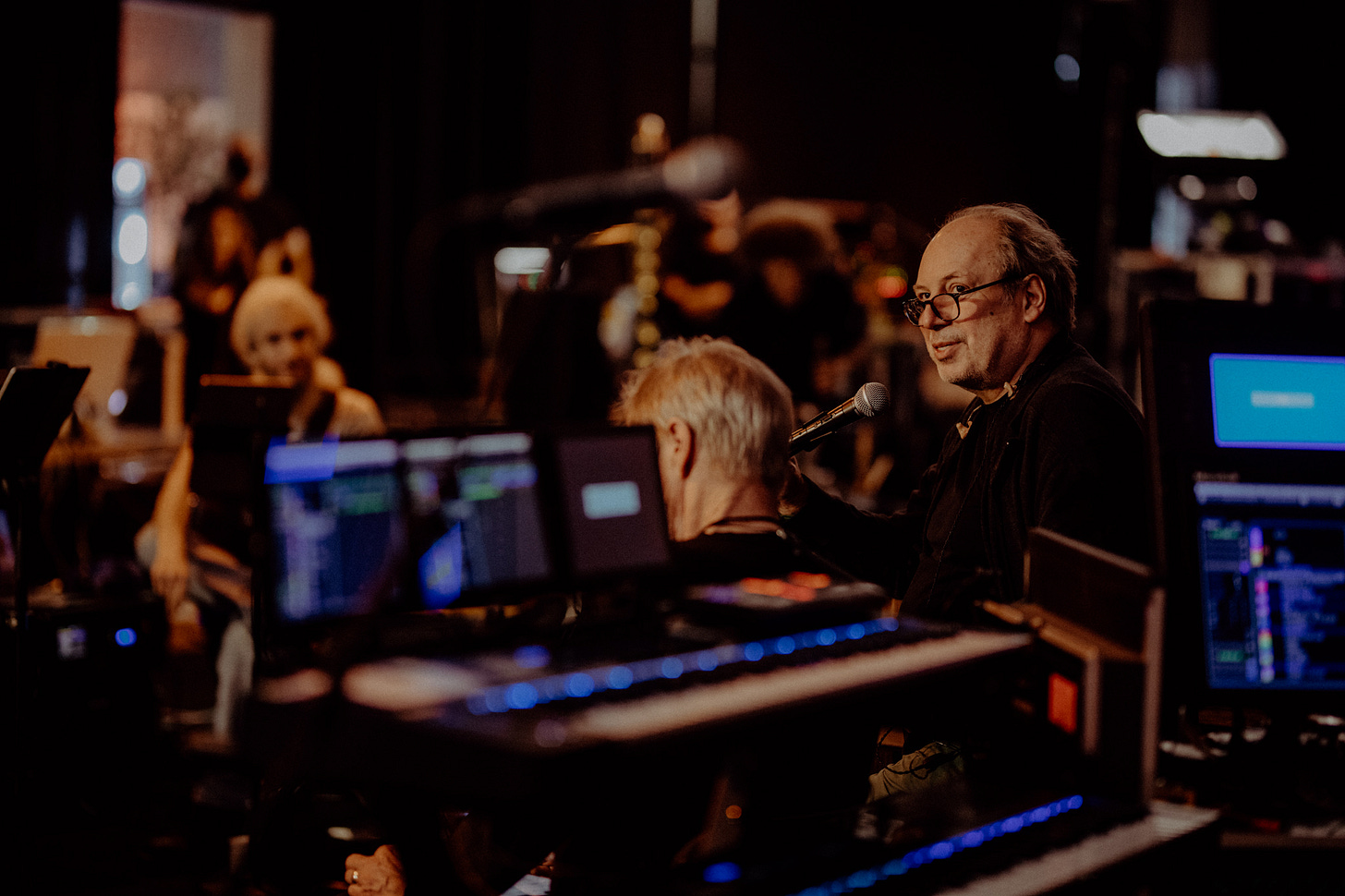Hans Zimmer: Music of War and Wonder
A conversation with composer Hans Zimmer about his music in Dune: Part Two and Blitz.
From the wind-swept deserts of distant worlds to the war-torn streets of 1940s London, legendary composer Hans Zimmer has defined some of the most iconic soundtracks in cinema history. His scores for The Dark Knight Trilogy (2005-2012), The Lion King (1994), Inception (2010), Blade Runner 2049 (2017), and Gladiator (2000) are instantly recognizable and continue to awe audiences worldwide.
Balancing music for major films with sold-out European concerts, Zimmer’s schedule seems almost impossible to manage. The Oscar-winning composer devotes himself equally to scoring films and bringing his extensive body of work to life on stage for fans around the globe.
In late 2024, I joined a small group of journalists for a Zoom press conference with Zimmer. Speaking from his Paris-themed Boto Design studio in Los Angeles, he discussed two of his recent projects: Denis Villeneuve’s Dune: Part Two and Steve McQueen’s World War II drama Blitz.
Returning to Arrakis
When it came to scoring Dune: Part Two, Hans Zimmer approached the project as a continuous journey that began with the first film. For him, the process wasn’t just about creating new music but about weaving a consistent musical narrative across both films. His collaboration with director Denis Villeneuve dates back to their shared love of Frank Herbert’s original novel.
“Denis and I both read the book when we were teenagers,” Zimmer explained. “I remember we were standing outside somewhere, and he said to me, ‘Have you ever heard of a book called Dune?’ I got so excited, like one of those little dachshunds when they’re let off the leash. I think it scared Denis a little! But we both already knew this world inside out. We were both, in a way, authorities on it.”
For Zimmer, working on Dune brought him back to the emotions he felt as a 13-year-old first discovering the story. But now, he had the experience and tools of a seasoned composer at his disposal. The key challenge was ensuring that the music spanned both films cohesively.
“I needed to know what the final note of Part Two would be before I wrote the first note of Part One,” he said. “This wasn’t a typical sequel — it’s not Shrek or Die Hard where you meet new characters and go off in a different direction. Our journey spans two films.”
Zimmer explained that he couldn’t simply create a new theme for Paul Atreides in Part Two. Instead, he built on the Atreides theme introduced in Dune: Part One.
“In the first film, it’s played on bagpipes,” he said. “That same melody evolved into the love theme in Part Two. If you listen carefully, it’s still there, just transformed. It’s a theme about family and love. But by the end of the second film, that theme plays in a moment where love is impossible — where Paul and Chani can’t be together. That transformation was key to the emotional arc.”
Zimmer compared his approach to scoring Dune to Howard Shore’s work on The Lord of the Rings.
“We’re telling one continuous story, just split into two films,” he said. “From the very first note I wrote, I had to know where I was going to end. Developing themes over time, rather than abandoning them or starting fresh, was essential. Otherwise, it would have been completely foolish.”
Zimmer also emphasized the importance of creating new material while ensuring continuity across both films.
“There’s always new material,” he said. “But part of the job with this movie is world-building, so everything has to interlink in a very particular way. It was really important to me that we didn’t just go for the big, symphonic, typical sci-fi sound.”
For Zimmer, that meant imagining the music of a distant future.
“I wanted to go 10,000 years into the future — to imagine instruments that don’t exist yet and create something unique,” he explained. “The whole score is just my band, and I pushed everyone to play with conviction and take risks.”
One of the standout elements of the score is Loire Cotler’s vocal performance, which Zimmer highlighted as central to the film’s soundscape.
“Loire Cotler, who is the voice of the movie, is a perfect example,” he said. “Her vocals are so raw and on the edge, like she’s almost losing her voice. It was about that level of commitment from everyone involved.”
In the video below: Hans Zimmer performing the Dune: Part One soundtrack with his band, including Loire Cotler (vocals), Pedro Eustache (flute), and Tina Guo (cello).
Zimmer’s drive to push musical boundaries led him to incorporate a variety of unconventional instruments into the score. One of the most distinctive was PVC piping.
“Absolutely,” he said. “PVC piping was one of the most important. You can make incredible woodwind-like sounds out of it, and it creates instruments that don’t exist in the traditional sense.”
Another key contributor to the unique soundscape was the late inventor Chas Smith, who created custom metal sculptures that were used as instruments in the score.
“I would tell him, ‘I need the sound of the wind moving across the desert,’ and he’d go off and build something — these huge sculptures that we used in the score,” Zimmer explained. “Sadly, Chas passed away from cancer halfway through the film, which was devastating. He was such a huge part of this process.”
Zimmer emphasized that the Dune score wasn’t recorded by a typical session orchestra. Instead, it was a close-knit group of musicians who had been on this journey with him for years.
“This wasn’t a session orchestra, you know?” he said. “Denis, his producer Tanya, and all of us became a family. And my band — we’ve traveled the world together. We’ve spent hours on buses, and let me tell you, if anything builds character, it’s the bus.”
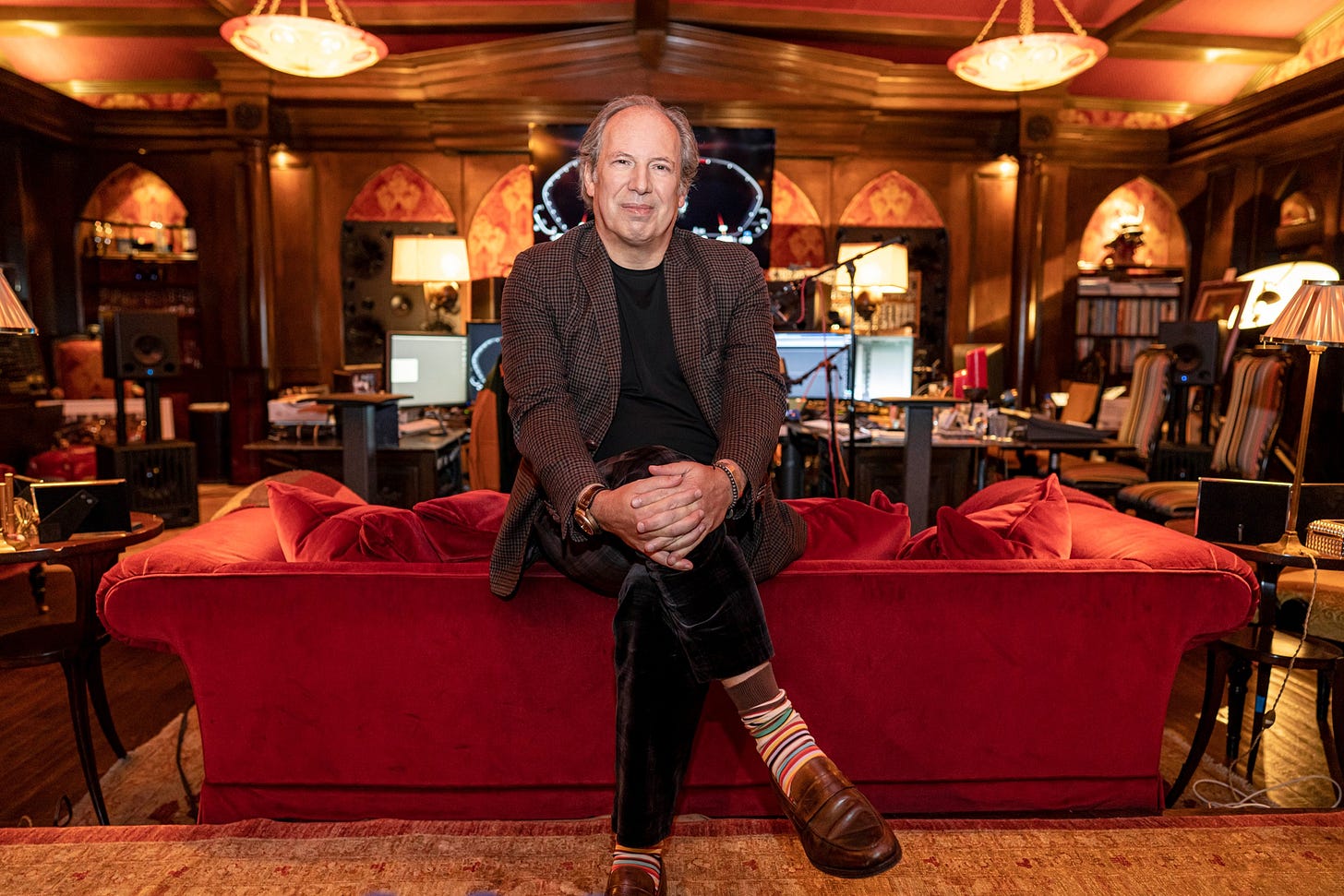
Colors of Music
When it comes to starting the writing process for a score, Zimmer doesn’t rely on scripts. Instead, he prefers to immerse himself in the visual and emotional world of the film by working closely with the directors and other key members of the production team.
“The most helpful thing for me isn’t reading a script — it’s sitting with the director and asking, ‘Tell me the story,’” he said. “That way, I get a sense of what’s important to them, what’s in their mind.”
Zimmer also engages with the director of photography and set designers to gather inspiration from the film’s visual style.
“I go to the director of photography and ask about the color palette,” he explained. “I visit the set designer because all of these things are very influential.”
However, he generally avoids discussing his work with the actors.
“I don’t usually ask the actors, though,” he said. “They’re still figuring things out — like who they are on this planet, how they’re going to portray their character. But I usually have an idea of what I want, and more often than not, it aligns with what they’re discovering.”
Zimmer’s process is always deeply tied to the narrative and character arcs of the film. One example he used was the ballad for Paul and Chani in Dune: Part Two.
“The original tune came from the moment Paul sets foot on this strange planet,” he explained. “It’s the bagpipe tune — which, actually, isn’t bagpipes at all. It’s Guthrie Govan playing guitar. And I forgot to tell Denis that!”
During one of their Q&A sessions, Villeneuve was surprised to learn this fact.
“He goes, ‘Wait, what?’” Zimmer recalled with a laugh. “No, I forgot to tell him!”
That tune symbolizes Paul’s transformation. “He had to change as a character the moment he stepped on Arrakis. It’s a journey of growth — learning how to become a man and learning how to love.”
The love theme was brought to life by Pedro Eustache, who played it on a duduk — a 3,000-year-old instrument.
“Pedro even modified it with PVC piping so it could play notes it wasn’t designed to handle,” Zimmer said. “What’s important about that piece is that it starts militaristic, but it becomes something more personal. In the vastness of these epic shots, the music needed to feel small and intimate — something that draws you in and makes you lean forward to listen.”
A Personal Connection to Blitz
When it came to scoring Steve McQueen’s Blitz, Zimmer’s approach was deeply personal. The story of the film resonated with him because of his mother’s experiences during the Blitz in London.
“My mother was a refugee from Germany and living in London during the Blitz,” he explained. “She was living — and everyone is going to think this sounds so wrong — but she was living in Mayfair. But if you really think about it, of course, that was the cheapest apartment available because you had to run down all those steps to find shelter. Nobody wanted to live in Mayfair at that time.”
Zimmer heard countless stories from his mother about what life was like during the Blitz. Despite being Jewish and fleeing Nazi Germany, she was still considered an “enemy alien” because she had come from Germany.
“There’s a story about enemy aliens in England at the beginning of the war,” Zimmer recalled. “They were all taken to the Isle of Wight. But then, suddenly, the upper classes noticed that the food at The Dorchester or The Savoy wasn’t very good anymore because all the chefs were Italian. So, the first people who were released from that internment were the chefs.”
Zimmer reflected on how being the child of immigrants influenced his understanding of history. “As a child of immigrants, you grow up constantly looking over your shoulder, reading everything you can about history. You want to understand where you come from. And when Steve McQueen came to me, he said one sentence that really struck me: ‘You’ll understand your mom better.’”
Initially, Zimmer shrugged off McQueen’s comment. But as he immersed himself in the film, the emotional weight of his mother’s stories hit him.
“The difference between hearing my mother’s stories and watching the film was that I was immersed in it,” he said. “Suddenly, I wasn’t just hearing the stories — I was feeling them.”
That emotional connection inspired Zimmer’s approach to the score. “I went to Steve and said, ‘This is what I’d like to do. I want to write a dissonant, terrorizing, discombobulated score.’ I told him, ‘I guarantee you, nobody will want a soundtrack album of this.’”
Zimmer wanted the music to reflect the disorientation and terror that children experienced during the Blitz.
“I was thinking about what it must have been like for a child in those circumstances — completely disoriented, living under a constant sense of terror and stress. That’s what I got from my mom’s stories.”
Zimmer also mentioned a key scene in Blitz where the boy meets other kids and climbs on top of a train. “It’s just glorious, pure heaven. That’s the thing about kids. They can go from terror to absolute bliss in a second.”
He described the score as “schizophrenic” — jumping from one emotional extreme to another. “I wanted it to be difficult. I didn’t want it to be sentimental. When I told Steve I wanted the music to be really controversial, his eyes just lit up.”
Comparing Freedom in Blitz and Dune
When asked whether he had more freedom to experiment with the Dune scores compared to a grounded film like Blitz, Zimmer was quick to clarify that both projects offered him the same level of creative freedom.
“I have equal freedom on both,” he said. “The only note I got on Blitz was from one of our producers. It was a text that simply said, ‘That takes balls.’ That was it.”
Zimmer emphasized the collaborative nature of his work with both directors. “These directors — Steve and Denis — they’re both very close to me. We’re really good friends, and we struggle through these things together. They’re co-authors of the music in many ways.”
Zimmer explained that he often writes music while the directors are present. “I write with Steve in the room. I write with Denis in the room. For Dune: Part Two, I wrote a bunch of pieces while Denis was taking a break. He’d say, ‘Hans, the movie is already out in theaters,’ and I’d just reply, ‘I know, but I know where we still need to go.’”
His dedication to his music is clear: “I kept writing so he’d have something to inspire him when he was writing his next screenplay.”
A Life in Music: On Stage and Beyond
Zimmer’s love for live performance has only grown over the years. He spoke about his ongoing concert tours, which have brought his music to audiences around the world.
“I think we have more subwoofers than anyone else right now!” he said with a laugh. “What happened was all the good things came together by sheer coincidence. My birthday fell on the date we were playing Madison Square Garden.”
Zimmer recalled a special moment during that performance when Lebo M, the voice of The Lion King, led the audience in singing.
“Oh, Lebo did! You know, the voice of The Lion King. No one’s stopping him from getting the crowd to sing.”
However, Zimmer revealed that he wasn’t at his best that night. “I had pneumonia. I wasn’t at my best on stage.”
After the show, Zimmer’s partner took matters into her own hands. “The woman who loves me called my doctor — who had been at the show — and said, ‘Look, I’ve taken Hans’ temperature. It’s not good, and he’s scheduled to go to Baltimore tomorrow.’ My doctor told her, ‘He’s going to one of two places: my hospital or his bed.’”
Zimmer admitted he was initially unaware of the plan. “The next morning, I woke up thinking I was late, rushing to get ready for Baltimore. But she said, ‘You’re not going anywhere. Doctor’s orders.’ So we had to cancel Baltimore.”
Despite the setback, Zimmer is determined to make up for the canceled show. “We’re working our way back. I’m not going to let anyone down.”
On the Road Again
While there are many talented and iconic film composers working today, I consider Hans Zimmer part of my “Holy Trinity” of favorite composers, alongside John Williams — the legendary maestro behind Star Wars and Indiana Jones — and Bear McCreary, the innovative, hurdy-gurdy-wielding metalhead who has defined shows like Battlestar Galactica and The Lord of the Rings: The Rings of Power.
Each of these composers brings their unique sound to the world of film, but Zimmer stands out for his fearless experimentation and willingness to think far outside the box. His work on Dune and Blitz proves that he’s still pushing boundaries, composing scores that hit us straight in the heart.
With Zimmer back on tour, I’m looking forward to experiencing his music live again — this time from the second row in Oslo, 2026. Few things compare to hearing his music thunder through a concert hall, reminding us why film scores have the power to reach far outside the screen.
This article is based on a small, moderated press conference held via Zoom on November 21st, 2024. The pictures of Hans Zimmer were provided by his team.





